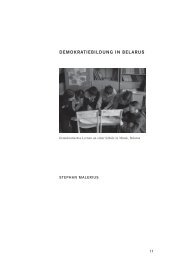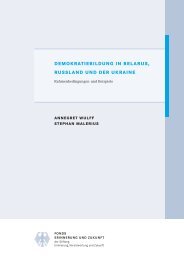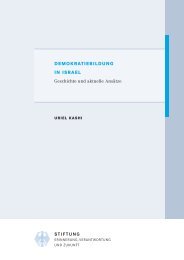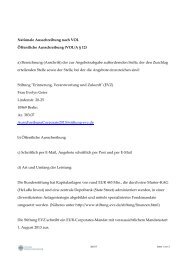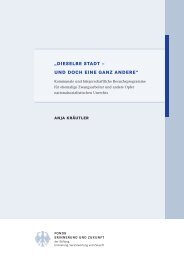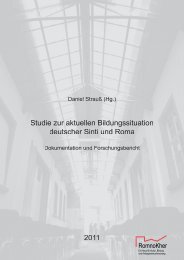chapter 2 - Stiftung "Erinnerung, Verantwortung und Zukunft"
chapter 2 - Stiftung "Erinnerung, Verantwortung und Zukunft"
chapter 2 - Stiftung "Erinnerung, Verantwortung und Zukunft"
Create successful ePaper yourself
Turn your PDF publications into a flip-book with our unique Google optimized e-Paper software.
Otto Böhm<br />
“State Speech – Hate Speech”<br />
The issue of hate speech also has a long and controversial history in the United States. Under US law, a hate<br />
crime is defined as a crime in which the perpetrator targets the victim for his or her perceived membership in<br />
a specific social or ethnic group. Judith Butler has analyzed the concept of hate crimes from a Foucauldian perspective<br />
that explores the subtle relationship between speech and power in juridical discourse, and criticizes<br />
state power from a left-wing standpoint. In a 1997 essay, she argues that “By ‘suspending’ the state action<br />
doctrine, proponents of hate speech prosecution may also suspend a critical <strong>und</strong>erstanding of the state power,<br />
relocating that power as the agency and effect of the citizen-subject. Indeed, if hate speech prosecution will<br />
be adjudicated by the state, in the form of judiciary, the state is tacitly figured as a neutral instrument of legal<br />
enforcement.” 26 As a feminist, Butler draws a parallel between the social power to define gender and the<br />
state’s power to define racial identity. Because the state is not a neutral party, she argues, society must take<br />
on the task of confronting racist ideologies. Any attempt to prosecute hate speech will necessarily confront the<br />
productive and definitional power of the state.<br />
Butler’s arguments rest on a particular <strong>und</strong>erstanding and skepticism toward the nation state that may be<br />
seen as refuting the concept of the nation state as the protector of human rights. One proponent of this latter<br />
ideal of the nation state was Hannah Arendt. Writing several decades before Butler, Arendt argued that the<br />
destruction of the nation state by totalitarianism would culminate in the destruction of human rights. For<br />
Arendt, therefore, the power of the state is separate from violence; the state does not promote the violence<br />
that exists in society. Quite the contrary: the state can be called on to exercise its power to protect the individual<br />
from social violence. 27 More recent theorists of democracy like Jürgen Habermas and John Rawls, in<br />
turn, have developed nuanced theories of the power of the state, linking state power to constitutional law,<br />
which is seen as an expression of the democratic will of the people. This link generates the requirements and<br />
criteria for legal and state intervention. For these recent democratic theorists, the law is not part of the “state<br />
apparatus,” but functions in tension with other state institutions. In these formulations, the power of the<br />
state – conceived as executive power or the “power to act” – may be used to achieve discriminatory laws or actions,<br />
but it may also be expressed in anti-discriminatory behavior. As the German Institute for Human Rights<br />
has noted, “power is always dependent on context… . The power to act is not f<strong>und</strong>amentally negative, but can<br />
also be used to protect human rights.” 28<br />
Establishing International Human Rights Norms<br />
Human rights issues are also central to the international lawmaking process, particularly in the area of discrimination.<br />
As noted briefly above, current international law includes numerous anti-discrimination regulations,<br />
ranging from United Nations statutes, to UN resolutions (for example, the 1970s resolutions on apartheid<br />
in South Africa), to the International Convention on the Elimination of All Forms of Discrimination. 29 In<br />
light of the existing international framework, when is it necessary to enact anti-discrimination legislation on<br />
a national level? Pointing to the examples of Rwanda and Yugoslavia, Zimmer stresses that the International<br />
Convention on the Elimination of All Forms of Discrimination permits “no margin of discretion. Racist speech<br />
and actions can be the start of a racist movement within a state” and therefore states must be required to<br />
26 Judith P. Butler, Excitable Speech: A Politics of the Performative (New York and London, 1997): 47.<br />
27 Hannah Arendt, Elemente <strong>und</strong> Ursprünge totalitärer Herrschaft, vol. 2 (Frankfurt a.M., Berlin and Vienna, 1951).<br />
28 Oliver Trisch, Der Schutz vor Diskriminierung: ein Strukturprinzip der Menschenrechte Unterrichtsmaterialien zur Menschenrechtsbildung (2006): 2.<br />
29 Zimmer, 37ff. and 212ff.<br />
96<br />
<strong>Stiftung</strong> EVZ<br />
HUMAN RIGHTS AND HISTORY: A CHALLENGE FOR EDUCATION



